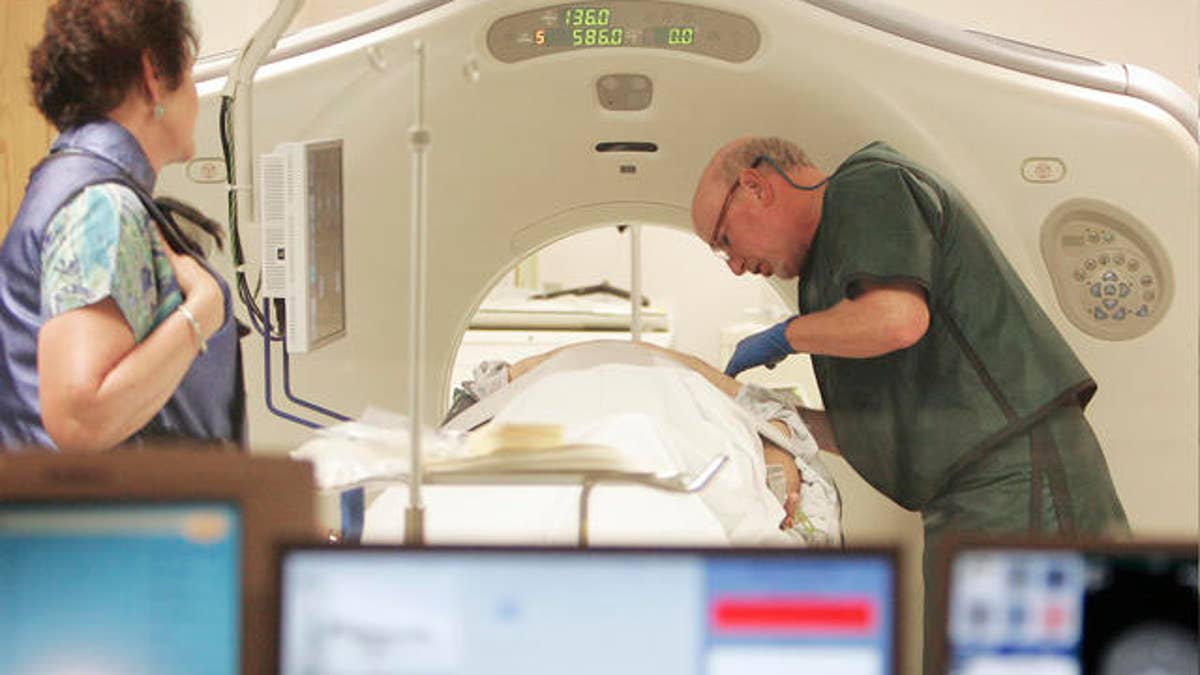
In this photo taken Thursday, June 3, 2010, Dr. Steven Birnbaum works a CT scanner with a patient at Southern New Hampshire Medical Center in Nashua, N.H. (AP Photo/Jim Cole) (AP)
One-third of people getting a CT scan didn't know the test exposed their body to radiation, in a new study from a single U.S. medical center.
Researchers found the majority of patients also underestimated the amount of radiation delivered by a CT scan, and just one in 20 believed the scan would increase their chance of ever getting cancer.
The study's lead researcher, Janet Busey, said doctors need to do a better job of talking to patients about the risks and benefits of the tests, including about radiation exposure.
One challenge is that there is still debate within the medical community about just how much long term cancer risk the scans carry, she said. That risk also depends on how many scans a patient gets and which organs are exposed to radiation.
"There's no doubt, CT saves lives," Busey, from the University of Washington in Seattle, told Reuters Health. And their benefits usually outweigh their risks, she added.
Still, even if the radiation risk is small, patients "definitely should be aware of it."
CT scans are high-powered X-rays that provide clearer images but expose patients to between ten and 100 times more radiation than a normal head or chest X-ray, for example.
Busey said from their earlier studies, she and her colleagues learned anecdotally that many patients didn't know much about CT scans. So they surveyed 235 people who were having a non-emergency scan, for example to check a cancer's spread or to look into symptoms such as shortness of breath.
Those scans included CTs as well as another type of imaging, known as single photon emission computed tomography, or SPECT scans.
Two-thirds of the patients believed their scan was definitely necessary and would benefit their health, and 84 percent said their doctors had explained the reason for the scan.
Another two-thirds of the patients understood CT scans involve radiation, but less than half of those had learned about radiation risks from their doctor.
Few patients were worried about the scans or the link between radiation exposure and cancer. More people reported having thought about when they could eat or whether their parking would be validated after the test than about the effects of radiation, according to findings published in JAMA Internal Medicine.
"It's really a physician's job to explain to a patient what the risks and the benefits are… and sometimes we need to do a better job," said Dr. Angela Mills, an emergency medicine researcher who has studied radiation risks at the Hospital of the University of Pennsylvania in Philadelphia.
The radiation dose from one CT scan typically ranges from a couple of millisieverts - comparable to the yearly background radiation from natural sources - to close to 20 millisieverts, the annual exposure limit for nuclear industry employees.
Although each scan only has a small impact on a person's long term risk of cancer, that risk can build over time with more scans and more radiation exposure.
"To me the problem is when patients have a problem that either is chronic or they keep having pain or maybe there are alternative ways to diagnose (their condition), and patients then need to be better informed what their options are," Mills, who wasn't involved in the new study, told Reuters Health.
For example, people who develop recurring kidney stones may be able to skip a scan altogether or get an ultrasound instead of having repeat CTs, she said.
One study from the National Cancer Institute estimated there would be about 29,000 future cancers related to scans done in 2007 alone. That year, Americans had about 72 million total CT scans.
Busey said it's important to educate all patients about the benefits and possible harms of their scans - but that it will be up to the larger medical community to figure out how to do that in a way that's both standardized across facilities and individualized to each patient's particular situation.
"It's a difficult concept to understand, and risk itself is difficult to talk about," especially because of the uncertainties involved, she said.
"This is the first step."








































